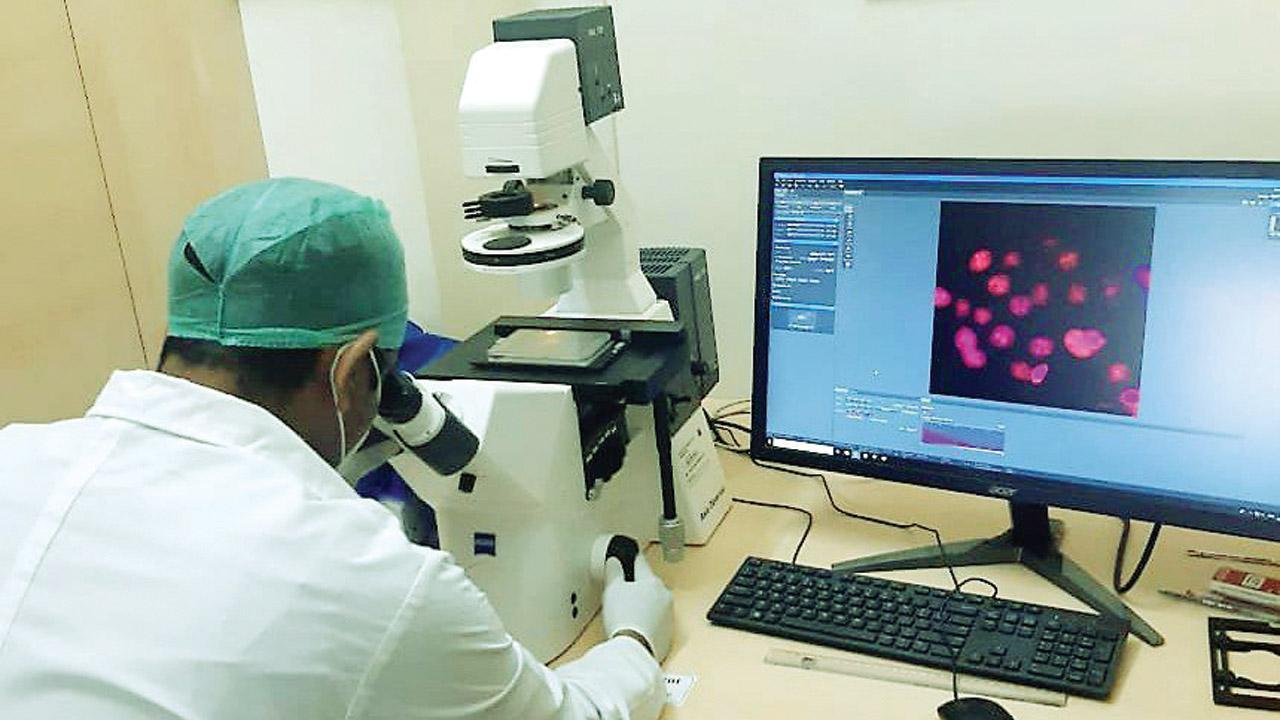This new tech by Pune experts is presumed to be pain-free and cost-effective; may help in improving treatments

The captured and isolated circulating tumour cells are being analysed under a fluorescence microscope at MIMER, Pune
Nanorobot technology might soon be India's new cancer weapon. A team of experts from the Maharashtra Institute of Medical Education and Research (MIMER), Pune, developed nanorobot-based liquid biopsies that are programmed for early detection of metastases (cancer cells) by isolating and detecting circulating tumour cells in any human blood.
ADVERTISEMENT
Metastases is the most common cause of cancer-related death in patients with solid tumours, and the use of nanorobotic technology would bring a change in the age-old traditional practice of conducting biopsy for histopathology tests to confirm if the lump is cancerous or not. This new technology is not only presumed to be cost-effective but also pain-free and is expected to lead to a new rapid and accurate diagnostic method for cancer in future.
The research has been funded (Rs 55 lakhs) by the Department of Science and Technology (DST), Government of India, and is headed by Dr Shashwat Banerjee, 44, who heads the Central Research Laboratory at MIMER, Pune, and has been working on this project for the past five years. He has also filed for patenting the research.
It is non-invasive precise
“Currently invasive biopsy and its subsequent genetic and proteomic analysis are painful, expensive, and difficult to interpret. On the other hand, liquid biopsy has several benefits such as it is non-invasive, rapid, precise, and especially real-time,” said Dr Shashwat. “In search of a better cancer diagnostic, we at MIMER have indigenously designed and developed, for the first time, smart nanorobots for detection of early metastases. The technology requires no more than 5 ml of human blood. Further, the test can be completed in about a few hours using the nanorobotic technology,” he said.
“The developed nanorobot uses chemical energy to perform mechanical work such as autonomous motion. The chemically powered nanorobot uses water as fuel. This new nanorobot based diagnostic tool may help in improving cancer treatments, allow for better treatment control, enable early interventions, and change decision making from reactive actions toward more predictive early interventions,” said Dr Shashwat. Interestingly, the research findings have been recently accepted for publication in the journal, Communications Chemistry (Nature Publishing Group) with the title “Water-Powered Self-Propelled Magnetic Nanobot for Rapid and Highly Efficient Capture of Circulating Tumor Cells”.
May revolutionise detection
Dr Ketan Vagholkar, professor of surgery at DY Patil Medical College, who usually performs Onco surgeries of the gastrointestinal tract, said, “The new nanorobot technology developed by researchers from MIMER is a great achievement. The concept of its ability to identify metastases at an early stage is encouraging. But, cancer comprises a wide spectrum of diseases. Whether it will help in the early detection of metastatic solid tumours or blood cancers will require more research and evaluation. However, once its practical utility is confirmed it will surely revolutionise cancer detection.”
'Need more detailed study'
Dr Meghal Sanghavi, Onco Surgeon at Wockhardt hospitals, Mumbai Central said, “The newer modalities for detection of breast cancer are vacuum-assisted biopsy (tissue-based analysis to detect cancer). The introduction of nanorobot technology would be a welcome move, towards research and development, which may turn out to be a probable cost-effective procedure in future, but this calls for more detailed study and analysis before we can look for concise and definitive answers. I would suggest that such research should be supported, as it might help in getting clarity when compared with conventional methods of screening/detection for cancer."
Dr Meghal added, “In a conventional method of biopsy, the same sample can also be used for testing other ailments if the finding is non-cancerous. Moreover, the conventional tests provide detailed reporting of their findings, with specific markers, which is useful to ascertain the diagnosis and even helps the treating surgeon to evaluate the patient better. Whereas, in the nanorobot technology method, we are not sure if the blood sample (5 ml) taken would be only restricted for cancer detection or it could be used for screening other ailments. Also, more R&D studies would be required to rule out any false positive cancer findings.”
In response, Dr Shaswat said, “At present, we have restricted our research to epithelial origin (colorectal, lung, breast, head and neck and colon) cancer detections, as it is our primary objective and we have also made headway in capturing more cancer cells in the given blood sample, which will thereby not only assist in understanding the origin of cancer, but also the stage of cancer. The tests can be repeated, as suggested by the treating oncologist, who can use the comparative studies to decide on the continuation of the line of treatment.
 Subscribe today by clicking the link and stay updated with the latest news!" Click here!
Subscribe today by clicking the link and stay updated with the latest news!" Click here!








